#plural history
Explore tagged Tumblr posts
Text
Many Voices Google Drive

Hello greater internet, specifically the plural/multiple side. We watched a presentation ages ago (you can find it here) about a brief history of DID and plural experiences by the great LB Lee (if you haven't already, check out their Dreamwidth, it's chalked full of great info and musing from a fellow multi). In it, they mentioned a MPD/DID magazine from the 90s called Many Voices.
So we took a look.
When we say we were floored by the content in this zine, I am understating by a wide margin. These digitized zines are like a plural history gold mine (if you want a real gold mine, lemme know and I'll make a post about The Archive as I affectionately call it). Here's the link to Many Voices' official website - the actual PDFs of the zine are under "Newsletter" (for each zine's specific TWs -> Subject Index - they're highly specific as well, so no need for guesswork). The website covers the entire history of the magazine and its founder, Lynn Wasnak, who was a plural from Ohio, USA. Since Lynn's passing, the site is owned and run by the ISST-D in perpetuity. We would highly recommend surfing through the entire catalog, it is one of the most navigable archive we've come across.
However, we did note that the format for the newsletters aren't formatted in the most accessible way (links to each PDF via month, all in separate documents), so we decided to compile them into one Google Drive Folder! Each PDF is sectioned by year in chronological order (Feb -> April -> June, etc). Please mind that we did all of this in the middle of the night so there may be some errors in the format. If you notice any, feel free to dm us or leave a comment.
We hope that this can introduce y'all to an exceptional piece of plural/multi history. Take care!
(Note: the final PDF, Many Voices 2012, consists of issues from Feb-Jun due to Lynn's deteriorating health and eventual passing in 2013)
#actually dissociative#actually plural#did system#dissociative identity disorder#endo system#plural gang#plurality#multiple#multiples#complex dissociative identity disorder#mental health#zines#osddid#c did#hc did#traumagenic system#endogenic system#mixed origin system#plural system#plural#plural history
117 notes
·
View notes
Text
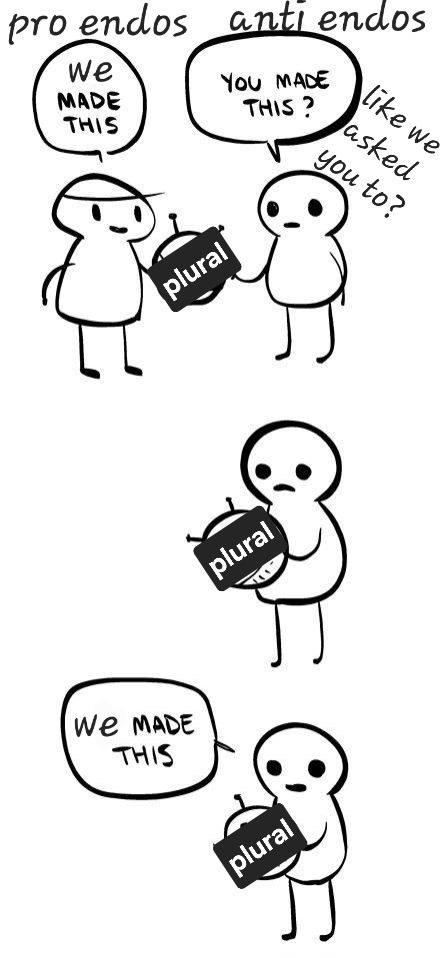
#hypocritical syscourse#pro syscourse conversation#pro endo#anti endo#plurality#plural history#full circle#the life cycle of terms#i swear I'll stop now
58 notes
·
View notes
Text
Some adorable soulbonding buttons I found archived in 2003 from this (now deleted) soulbonding webpage.













(Disclaimer: This is an archiving blog that posts about plural history. Links and images in this post are from the past, saved by the wayback machine. Please be mindful that not all soulbonders consider themselves plural or consider their soulbonding to be plurality.)
#plural deep dive#plurality#soulbond#soulbonding#soulbonding history#plural history#pluraldeepdive#sunflower posts
95 notes
·
View notes
Text
@amity-moonrise
I don't typically do straight-up callouts like this.
But what we are NOT going to do is muddle up plural history with lies and made-up discourse. If you want to coin another term for endos, that's great! But you do NOT get to make things up about the history of terminology in this community and you are NOT going to delete my reblogs clarifying. This community is already rife with misinformation, why do you feel it's necessary to make it worse? The term endogenic was NEVER made to be ableist and I can, quite frankly, just link you the document if you actually wanted to learn about it.
13 notes
·
View notes
Text
Anti-endos Erasing Alterhuman History:
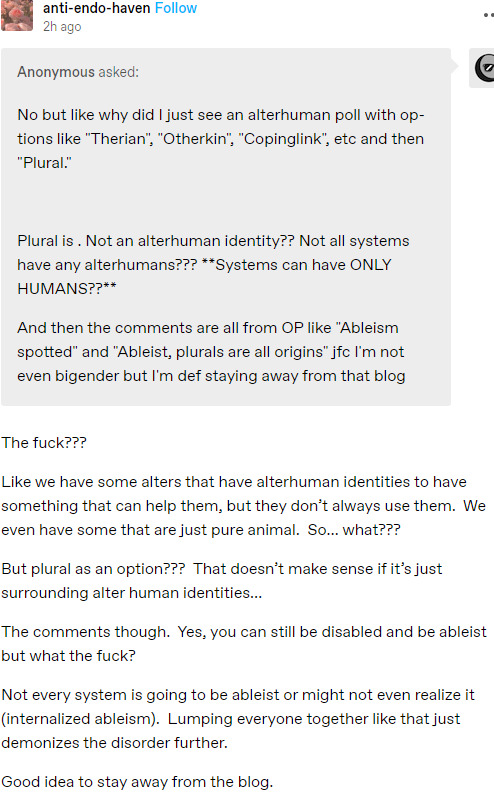
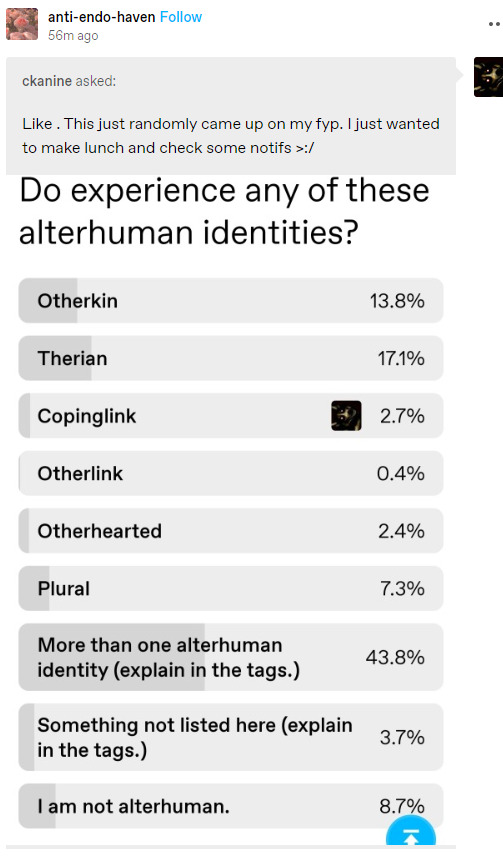
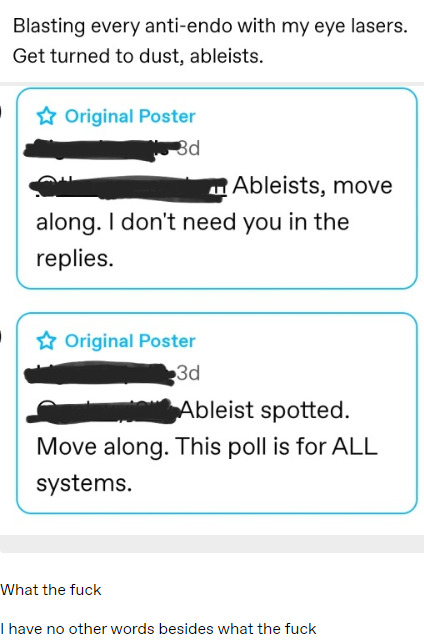
Ooh! I have some words!
ALTERHUMAN HAS ALWAYS BEEN AN INCLUSIVE LABEL!
See the coining post for alterhuman:
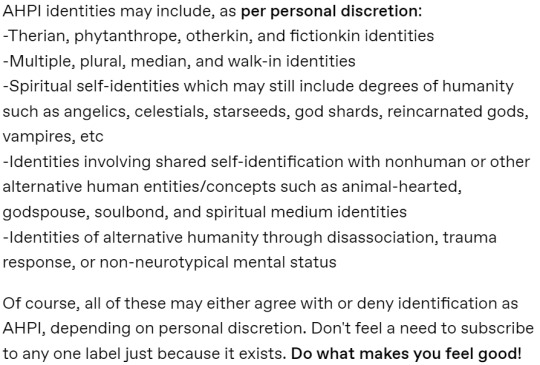
Alterhuman has always included plurals underneath its umbrella. Not all plurals are required to identify as alterhuman, but plurality is covered as an alterhuman identity. As are specifically endogenic forms of plurality, such as soulbonds and walk-ins.
If you don't support that, then you don't support alterhumanity.
#alterhuman#alterhumanity#syscourse#alterhuman community#alterhumans#pro endogenic#pro endo#multiplicity#nonhuman#sysblr#system discourse#actually plural#actually a system#history#plural history#alterhuman history
30 notes
·
View notes
Note
OP we saw some posts on your dash and, we COULD be wrong here but we are like between 90% ane 98% sure @solipsistful coined quoigenic specifically as a fuck you to the binary of endogenic and traumagenic. We're pretty sure specifically in the way mixed origins systems often use the term mixed origin.
We wanted to send well wishes and say we are very sorry for all of the mixed origin systems who feel they've gotten pushed out of using quoigenic for whatever reason. It's completely bullshit the OG term that was made SPECIFICALLY for systems like mixed origin systems is being lumped under endogenic and that is why people don't use it.
Oh hello! thank u for bringing up terminology history! We often see quoigenic used as a term for uncertain origins and couldn't think up any other terms that don't specifically fall under either for the life of us, so we went and checked out its history in more depth and it's really fascinating!
Pluralpedia defines quoigenic as an origin term used to indicate that the user does not know their origin, does not want to share their origin, does not think their origin is relevant, or thinks it's the wrong question to ask.
the two sources linked in the wiki from the creator are here and here; the first is an archive of the coining post, and the second is elaboration from an ask response. We find these quotes from the second one to be striking;
"I Don’t Know Why I’m This Way And It’s Not Important To Me To Ask, among other rejections of definition and origin story"
"included in this, potentially though not necessarily: frustration/discomfort with a sharp line being drawn between spiritual and psychological otherkin, between traumagenic and endogenic (”natural”) multiple systems [...]"
I have to admit, probably the only reason we ID as traumaendo rather than quoigenic is because we have a fixation on identifying our intricacies and understanding them. We use traumaendo as a defiance of the binary proudly as well ^^ ty again!
17 notes
·
View notes
Text
This week’s interesting read is from the coiner of ‘Empowered Multiple’ on darkpersonalities discussing plurals who don’t fit the medical standard of plurality.
#Plural writing#TWR#txt#actuallyplural#actuallyosdd#actuallydid#plural history#Plural community#Empowered multiple#dissociative identity disorder#endogenic plurality#endogenic
3 notes
·
View notes
Text
Seeing other gimmick accounts playing "fantasy" anti-demon racism as a joke and jumping in to defend demons while making it seem like we're playing along and participating in the bit but *really* really there are actual demons in our system who suffer in real life from anti-demon hate which is a real thing especially among religious people and plural systems have a history of being diagnosed with possession and suffering religious abuse and exorcism for millenia.
#demon#nonhuman#religious abuse#exorcism#gimmick account#twitter#nonhuman community#plural#plural history#plural system#nonhuman alter
2 notes
·
View notes
Text
Image description: The first image is an excerpt from the paper in question. It says, "One patient reconfigured her alters after reading J.R.R. Tolkien's Lord of the Rings, and presented a complex cadre of alters based on hobbits, orcs, and wizards; another used Shakespeare's Tempest, a situation that became clear when I encountered an alter named Caliban."
The second image is a screenshot of a Tumblr reply from user blu-cheavy-main, saying: "hey do you have a link to the paper?" End image descriptions.
That's a very interesting paper! A book by the same author, Richard P. Kluft, also talks about fictional introjects. Childhood Antecedents of Multiple Personality, published in 1985 by American Psychiatric Press. You can borrow it from the Archive.org library or use WorldCat to see if you can borrow it from a library near you.
Kluft's book is the earliest academic source-- and earliest source, period-- listed in a booklet of history research by House of Chimeras, A Collection of Mentions of Nonhuman and Fictional-Based Members of Plural Systems. Chimeras's booklet gives this summary of the relevant part of Kluft's book:
"On page 180 while talking about the alters included within a specific case of multiplicity, the author [Kluft] noted one alter in the system was based on a character from The Hulk series and Captain Kirk from Star Trek, another alter had some similarities to Mr. Spock from Star Trek, and two other female alters had the same name as the two female characters from the series The Flintstones."
These are even different characters than the ones that the 1988 paper wrote about. Between the two sources, these tell about three different systems who had fictional introjects in the 1980s.
Think systems with a high number of fictional introjects are a new phenomena? Kluft's paper on polyfragmented/extremely complex DID from 1988 includes a patient with LOTR introjects, and another based off of Shakespear's Tempest. Fictional introjects have been a thing for a very long time!

#plural#Dissociative Identity Disorder#DID#Star Trek#Flintstones#fictional introject#fictive#from 1980s#alterhuman history#plural history#screen reader friendly#Lord of the Rings#Shakespeare#hobbit#orc#long post#Marvel Comics#inner world
6K notes
·
View notes
Text
A not-so-gentle syscourse reminder
"Plural" was created to distance the early versions of the current endogenic communities from more clinical terms.
It was never a CDD term.
Learn your history.
This is one reason our clan encourages use of the word "plural" rather than "multiple". "Multiple", even standing by itself, brings to mind MPD/DID, "multiple personality disorder", "dissociative identity disorder", which are specific diagnoses created by the medical/therapeutic community. "Plural" is a much more neutral word, more commonly heard in the context of grammar than psychiatry. (The other reason, of course, is that plural can be construed to have a broader meaning, applying to anyone(s) anywhere on the continuum who experience themselves as plural in some way. )
#syscourse#anti endo#pro endo#pro syscourse conversation#pro system#debunk#system history#plural history
87 notes
·
View notes
Text

I want to share this archive of Multiple Personality Gift -- a workbook for people who have or are questioning DID or any sort of trauma-formed system. I believe it was written back in 1991 by Jacklyn M. Pia, a satanic ritual abuse survivor and DID system.
Click here to read it.
It's pretty short but a wonderful read, nonetheless! ��💕 Although the information about DID is somewhat outdated, there's so much love and positivity put into this workbook. Many of the tips they give about system management are things that I also learned in therapy for my DID. It can be very, very helpful. I hope you guys enjoy reading it!
(Disclaimer: This is an archiving blog that posts about plural history. The events and resources in this post are from the past. Please be mindful that language/views especially regarding mental disorders changes over time. Sources on this post may not reflect up-to-date info on dissociative disorders or plurality.)
#plural deep dive#plural history#did history#actuallydid#dissociative identity disorder#plurality#pluralgang#pluraldeepdive#sunflower posts
82 notes
·
View notes
Text
If you want to read the newsletter itself, you can download this issue and all its other back issues from its official website. The newsletter's late founder, Lynn Wasnak, wished for it all to be available for free, a gift made together with its current owners, the International Society for the Study of Trauma and Dissociation. There are 141 issues spanning 1989 to 2012.
Those are scans that aren't screen reader friendly or keyword searchable, so plural archivist and historian LB Lee asked me to optimize them so that they will be. I uploaded the new version with the optical character recognition (OCR) feature to this Google Drive folder. It's not perfect, but it'll be easier to find things in it.
LB Lee plans to put the OCR versions of them into the libraries of Archive.org, to help preserve this part of plural history. Later I'll add a reblog here with a link to that.
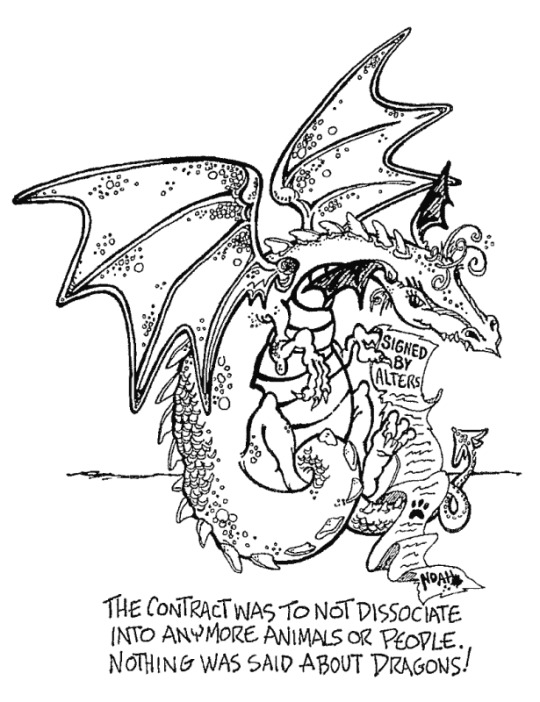
(Image description in alt text.) This is a comic that I found in a decades old issue of a magazine about multiples and DID systems, Many Voices: Words of Hope for People Recovering from Trauma and Dissociation, Vol XI, No.4, August 1999, ISSN 1042-2277. Illustrations and comics in this magazine are usually credited only by an artist's signature, which may be unclear or absent. This one doesn't have an artist credit, so Noah might be the signature, a name that doesn't appear elsewhere in the issue.
#plural#dissociative identity disorder#DID#history#plural history#archive#from 1980s#from 1990s#from 2000s#from 2010s#LB Lee#Lynn Wasnak#Many Voices#endogenic safe#archive.org#dissociation#dragon
1K notes
·
View notes
Text
Sometimes I wonder what life was like for plurals of the past. By that I mean – we know of the history of asylums and social outcasting of anyone who did not fit mental or behavioral norms of the past, yes (trends that have continued, although less common and in new forms, into the modern day), maybe even sometimes of those whose plurality was/is part of their culture (so important, and yet so rarely am I able to learn about them), but what of those who flew under the radar? Those who did not know of their own plurality, or perhaps knew, but kept it secret?
How many philosophers and scientists came up with their ideas by conversing with their headmates?
What of the authors who thought speaking directly to your characters on how their story goes was a universal writing experience?
Did any plural leaders who sought the guidance of their council assume that all the advice given to them was decided upon through an internal meeting of selves, just like how they made decisions?
Were there artists who couldn't find the words to explain their drawings were of their headmates? Storytellers who told tales from their exomemories? Record keepers, secretaries, and scribes who were so good at their jobs because they had practice from having to leave records for themselves?
When and where were the plurals like us?
I see hints of potential plurals of history, sometimes – typically in discussions of the self made by poets or philosophers. And there are a few cases that stand out as evidence that we have always been here. But plurality is so often a personal experience, with any observable behavior often brushed over, shunted away from others' knowledge, or just lost in records muddled by how difficult they are to find, that it's hard to make any theories or guesses about the plurals who might have been. Especially with how we're still barely known to most people; there would have been even fewer opportunities for these plurals of the past to find themselves and words for who they are.
It's... something I think about, when I'm looking at studies or learning about history.
Did plural gentleman living in England during the Victorian era get an unexplained thrill whenever they wrote of themselves in the third person for letters, per proper etiquette? Would they have any idea why referring to themselves in the third person felt right, the same way it can feel right for systems referring to themselves by their bodily name today?
Well. How should I know?
But I hope plurals of the past were able to have moments of plural joy, too.
794 notes
·
View notes
Text
Plurality in history should be studied, I feel like it could explain a lot of things
21 notes
·
View notes
Note
hey! so i saw in one of your posts that a lot of system terminology that ppl claim is stolen isn't actually stolen, i'd like to know if you have a list or source with terms that aren't stolen? thank you in advance!
This is actually a bit of a hard ask. It would be impossible to list them all, and every time I turn around someone is saying a new term is stolen. Sourcing most of this would be impossible, as the proof is either in the complete lack of use in clinical literature (eg system hopping, with my all access, I've never seen it used, even within RAMCOA literature, and @sophieinwonderland found the coining of it, if you want to drop a link to it), or its extreme overuse in other fields and concepts (eg system).
Obviously system hopping isn't stolen, system reset is one we never wanted and isn't ours, side system is community made.
Endogenic, traumagenic, and dissociation don't belong to us.
System itself is better said to have started in clinical literature for early DID but has expanded to so much more. Fighting this point is a losing battle, and that has nothing to do with endos and more to do with IFS therapy and it being such a generic word with so many uses. So long as people stop lying and saying it was never used for DID before IFS therapy in the 80s, I don't care about this one. It's like fighting with a programmer over computer system because its use in that respect is implying people with CDDs aren't human. I have issues with shared language and I wish there were different terms, but you have to just accept this one.
Most endos are pretty respectful about system roles, and they're not too interested in using them, much like introject, dormancy, and alter. Most endos burst into flames if you so much as even think those words in their direction. This falls into the same problem as system, and it was more IFS that fucked it, not endos, so while I'm extremely protective over some terms, like introject, persecutor and protector, you can't really help it. Look at the word little, it's not only endos using it. Even the very IDEA of system roles exists in IFS. Like, if you ask me, I think IFS might be what a number of endogenic systems are experiencing, but that's a topic for another time.
Plural was never for people with DID, multiple was the typical/preferred term for the longest time for medicalized systems, but I've actually seen the opposite happening and CDD systems are saying multiple is the endo term and plural is ours. Weird, but okay.
Fictive started in the soulbonding community.
Alter and subsystem are both so convoluted in psychiatry that the most you can say is that they're general clinical terms. I don't know why any endo would want to use them, but I do see subsystem used a bit (and my wording was that most words aren't stolen).
I'm sure people can think of a thousand others, but I think that covers the major ones.
Thanks to @pluraldeepdive for the help with this one, give them a follow if you're not already, their blog is wonderful.
#syscourse#pro syscourse conversation#debunk#CDD history#plural history#pro endo#anti endo#endo neutral#did#osdd#system#osddid#plural
28 notes
·
View notes
Text

"Long ago I began to create other people in my mind's eye who experienced certain experiences instead of myself. I did fairly well for a long time with these girls existing in my mind as ideas for stories I wanted to someday write. But as time went along they began to feel more real to me. I had begun to take them very seriously indeed--not just as characters for stories but as names for parts of myself."
I want to share this archive from 1998 of someone's personal experience with their DID. They describe discovering their system through creating characters and writing stories. They view their system as both parts of themself and as fictional characters that they purposefully created.
Click here to visit the archived website. (Potential TW for mentions of abuse and trauma!)
DISCLAIMER: Since this is about someone's interpretation of their own personal experiences, I ask that people please be respectful in the comments. Please be mindful that this is a snapshot of the past; language/views especially regarding mental disorders change over time. Regardless of your views on DID or systems, I will not tolerate anyone disrespecting or speculating about this person's life and mental health.
#plural deep dive#plurality#pluralgang#dissociative identity disorder#did history#plural history#sunflower posts
72 notes
·
View notes